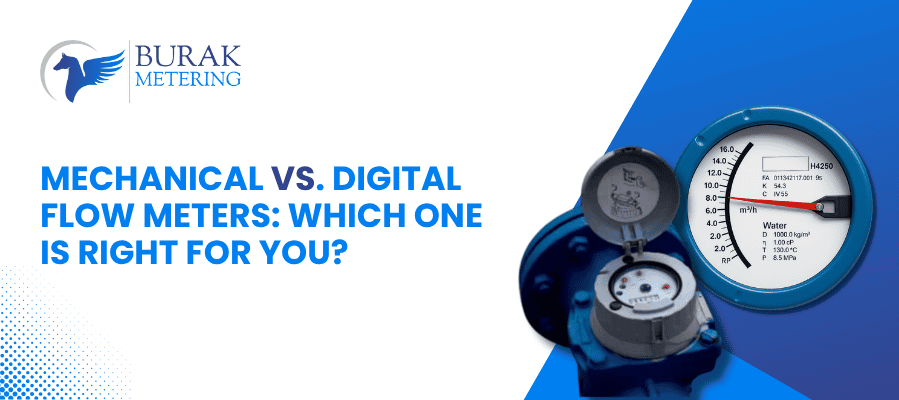 Phone
Phone

In recent years, flow meters have become essential for the flow measurement of liquids and gases in various industries for applications like oil, gas treatment, and chemical processing. Thus, having the right flowmeter ensures accurate flow measurement and efficient operations.
However, as different types of flowmeters are available, one common confusion arises — should you choose a mechanical flow meter or a digital flow meter?
Various factors affect the choice between a mechanical and a digital flow meter.
In this blog, we'll explore the key differences and best use cases for each type of flow meter.
A digital flowmeter measures the flow of liquids or gases through electronic sensors, instead of mechanical moving parts.
It converts the flow data into digital signals, which are displayed on the screen or transmitted to other systems for monitoring and further analysis. These systems are used in industries that require precise and continuous flow measurement.
Digital flow meters operate on different principles depending on the type. Some use ultrasonic waves, which are sent through the fluid or gas against the flow. The meter measures how long it takes for the sound waves to move in both directions.
This method is called the transit-time principle and is commonly used in ultrasonic flow meters.
Others work on the electromagnetic principle, where a magnetic field is applied to a conductive liquid and the voltage generated by the fluid movement is measured to calculate the flow.
There are also thermal flow meters, which measure heat dissipation to determine the flow of gases.
As they don't rely on mechanical components, they measure flow with high precision and can be used in extreme temperatures and pressures.
A mechanical flow meter is a device that measures the flow of liquids or gases by using moving parts.
When the fluid passes through, it pushes the internal components like gears, turbines, or pistons, and the movement of the components is used to calculate the flow rate.
The good thing is that they do not require electricity.
Different types of mechanical flowmeters work in slightly different ways.
For example, in a turbine flowmeter, the fluids move a small turbine inside the meter, and the speed of the rotating turbine helps to measure the flow rate.
Since the mechanical flow meters rely on physical movements, they work best with clean fluids. They are commonly used in applications like water distribution, fuel measurement, and oil and gas industries.
From mechanical to digital, we’ve got the perfect flow meter for your needs. Check out Burak’s expert solutions!
| Factor | Mechanical Flow Meters | Digital Flow Meters |
|---|---|---|
| Working Principle | It uses moving parts like (turbines, gears, pistons) to measure flow. | It uses electronic sensors like ultrasonic, electromagnetic, or thermal sensors. |
| Accuracy | Moderate, as it can be affected by wear and tear. | They are highly accurate with minimal errors. |
| Maintenance | Mechanical meters require regular maintenance due to moving parts. | It requires low maintenance since there are no moving components. |
| Power Requirement | It does not need electricity because it works mechanically. | Electronic flowmeters require a power source like (battery or external). |
| Data Monitoring & Integration | It provides only local readings and no remote monitoring. | They can store, transmit, and integrate data with systems for real-time monitoring. |
| Suitability for Fluids | Best for clean fluids and debris, but thick liquids can cause blockages. | Works with a variety of fluids, including viscous and contaminated liquids. |
| Cost | The initial cost is low but you may need to spend later on its maintenance. | It seems costly initially but saves money in the long run. |
Let's understand which flow meter is suitable for your needs.
Choosing between a mechanical and digital flowmeter depends on your specific needs, like accuracy, maintenance, power availability, and data monitoring requirements.
Ultimately, the right choice comes down to your application, budget, and long-term operational goals. By evaluating these factors, you can invest in a flow meter that enhances efficiency, reduces downtime, and ensures accurate flow measurement for your processes.
I hope you now clearly understand which flow meter suits your needs.
If so, why wait?
Take the next step and choose the right flow meter for your application.
Burak, a leading manufacturer of high-quality flow meters, offers reliable and accurate solutions for various industries.
Contact us today to learn more and find the perfect flow meter for your requirements!